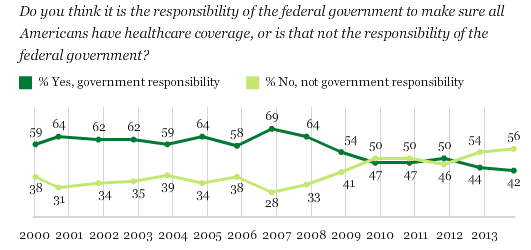Economist Jonathan Gruber set off a new debate over healthcare this week with his, let’s say, indelicate comments about Obamacare’s passage relying on the “stupidity of the American voter.” Gruber, who helped craft the law, said certain provisions of the law had to be written for optics rather than logic—so, for example, instead of simply writing checks to the poor or sick, it regulates insurance companies to make them charge higher rates to healthier people so that they can offer lower rates to sicker people.
What the writers of the Affordable Care Act didn’t need to mask was the underlying goal of the law: to ensure that every American would have healthcare coverage. Even if the methods were byzantine or unpopular, President Obama had campaigned on the healthcare-for-all message, and it had been broadly popular for the previous decade.
Since he took up reform, it hasn’t been.
A Gallup poll has found that for a third consecutive year, a majority of Americans (52 percent) agree that it is not the responsibility of the federal government to make sure all Americans have healthcare coverage. That opposition is in stark reversal of opinions before before 2009: Going back to 2000, the first year the question was asked, a majority consistently took the opposite view, with 69 percent supporting the government’s role as recently as 2007. In between, opinions have fluctuated but stayed roughly balanced.
Opinions on Government's Duty to Provide Healthcare
As Gallup’s Frank Newport points out, the issue is highly politicized. Most Democrats agree healthcare coverage is the government’s job; most Republicans don’t. Although most of those who bought insurance through a government exchange are satisfied, Obamacare’s overall approval is down to a record low of 37 percent amid continued partisan bickering and after a disastrous initial rollout.
Looking back two decades to Bill Clinton’s attempt at passing a healthcare plan suggests that Americans tend to like the idea of the government guaranteeing coverage in theory, but they start to change their minds when they have to face the gritty details.
In 1993, when Clinton prepared to present his own plan to enable healthcare for all, he faced a nation that supported the idea by a significant majority. In the spring of that year, 71 percent of Americans had said they approved the initial proposal. By June 1994, support had crumbled, and only 33 percent thought the proposal would be good for the country. Why? The push was a political catastrophe. The authors of a 1995 Health Affairs paper pointed to strategic mistakes (like failing to adequately consult private-sector leaders) and substantive mistakes (like proposing to use government-set limits on national and regional spending that felt to some like rationing). Opposition interest groups highlighted flaws, and middle-class Americans worried about how they would pay for expanding access.
In short, when the details got out, people didn’t like them, and they soured on the whole principle. Maybe Gruber had a point. He just phrased it stupidly.
Original Article
Source: theatlantic.com/
Author: NOAH GORDON
What the writers of the Affordable Care Act didn’t need to mask was the underlying goal of the law: to ensure that every American would have healthcare coverage. Even if the methods were byzantine or unpopular, President Obama had campaigned on the healthcare-for-all message, and it had been broadly popular for the previous decade.
Since he took up reform, it hasn’t been.
A Gallup poll has found that for a third consecutive year, a majority of Americans (52 percent) agree that it is not the responsibility of the federal government to make sure all Americans have healthcare coverage. That opposition is in stark reversal of opinions before before 2009: Going back to 2000, the first year the question was asked, a majority consistently took the opposite view, with 69 percent supporting the government’s role as recently as 2007. In between, opinions have fluctuated but stayed roughly balanced.
Opinions on Government's Duty to Provide Healthcare
As Gallup’s Frank Newport points out, the issue is highly politicized. Most Democrats agree healthcare coverage is the government’s job; most Republicans don’t. Although most of those who bought insurance through a government exchange are satisfied, Obamacare’s overall approval is down to a record low of 37 percent amid continued partisan bickering and after a disastrous initial rollout.
Looking back two decades to Bill Clinton’s attempt at passing a healthcare plan suggests that Americans tend to like the idea of the government guaranteeing coverage in theory, but they start to change their minds when they have to face the gritty details.
In 1993, when Clinton prepared to present his own plan to enable healthcare for all, he faced a nation that supported the idea by a significant majority. In the spring of that year, 71 percent of Americans had said they approved the initial proposal. By June 1994, support had crumbled, and only 33 percent thought the proposal would be good for the country. Why? The push was a political catastrophe. The authors of a 1995 Health Affairs paper pointed to strategic mistakes (like failing to adequately consult private-sector leaders) and substantive mistakes (like proposing to use government-set limits on national and regional spending that felt to some like rationing). Opposition interest groups highlighted flaws, and middle-class Americans worried about how they would pay for expanding access.
In short, when the details got out, people didn’t like them, and they soured on the whole principle. Maybe Gruber had a point. He just phrased it stupidly.
Original Article
Source: theatlantic.com/
Author: NOAH GORDON


No comments:
Post a Comment